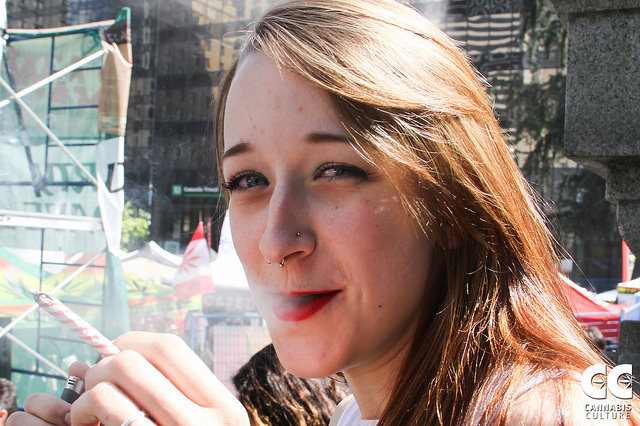Hint: Not all strains are created equal
It’s 2015, recreational marijuana usage is legal in four states and Washington D.C. and medical marijuana is legal in 20 other states.
This is why I thought that when I chose this as the topic of my thesis to complete my master’s degree in clinical-community psychology, I would get an unbiased view from both sides of the coin about the pros and cons of marijuana’s effects on peoples’ psychological well-being.
I was wrong.
My countless hours of research uncovered mostly outdated materials telling me that marijuana causes schizophrenia, depression and is also the devil (see Refer Madness circa 1936).
Marijuana is a hot topic in our country right now, but there seemed to be so little research on how this plant affects the psychological functioning of people consuming it on a regular basis. I wanted to hear from individuals who were dealing with this issue in some capacity so I set out to interview practitioners who were certifying patients, conducting research and advocating for medical marijuana usage in the mental health arena in states where it is currently legal.
I ended up with seven participants (whose names I will leave out for anonymity purposes) that were a mix of doctors, nurses, researchers and dispensary owners. I conducted qualitative interviews with them via phone and e-mail.
I’m not an expert on the plant, but I had always perceived marijuana as basically harmless. Operating under this biased assumption, I expected my participants to echo that sentiment. After speaking with my first participant, a medical doctor in Maine who certifies patients, I realized the results weren’t going to be so cookie cutter after all:
I have certified some people with different forms of schizophrenia with their psychiatrist’s permission who have actually been helped by medical marijuana and, unfortunately, it is really difficult for me to say across the board whether this is helpful or not because different plants are really different medicines. Different strains can have completely different effects. We know there are at least 20 different cannabinoids in marijuana that all have different effects, some actually work at the level of the central nervous system and others don’t even cross the blood brain barrier. We’re talking about a whole class of medicine rather than marijuana as a single medicine.
My research backed him up too. Amidst articles telling me that marijuana was the root of all things schizophrenia, there were several singing the praises of cannabidiol (CBD), a chemical compound (or cannabinoid) found in various marijuana strains, as a safe treatment for the disorder.
Now, before anyone gets sassy with me, I’m not suggesting that someone hearing voices should run to the nearest dispensary and pick up the heaviest CBD strain they can find. A lot more research still needs to be done on this topic, especially when it comes to psychotic disorders such as schizophrenia. But there did seem to be a growing trend in these practitioners’ dialogues regarding their patients’ positive mental health experiences with medical marijuana.
My first participant also told me:
If somebody has cancer and they are depressed, I can certify them for the cancer and later on when I follow up with them I can ask them about their depression and generally speaking they say, “It has really helped me.”
The third participant I interviewed, a doctor of osteopathy (DO) in Maine who certifies patients, said:
I see patients daily who are able to stop using opioid pain medications, benzos for anxiety, Ambien for sleep and use cannabis instead.
I also spoke with a doctor of philosophy (PhD) in social welfare who lives in California and previously investigated marijuana’s role in addictions:
My research shows that people have used marijuana as a substitute for alcohol and other drugs when they feel they might have problematic uses of those substances. I have also conducted research in which a small sample of active meth users were able to reduce or eliminate their use of meth while using cannabis.
Finally, my participants with certifying capabilities unanimously agreed that marijuana helps their post-traumatic stress disorder patients (PTSD) ten-fold, but I believe my first participant put it the most eloquently when he said:
Once they are on medical marijuana and I follow up with them their sleep quality is normal, they have resting dreams, they even dream the same sorts of dreams they had before they were on medical marijuana, but they’re not emotionally entangled in those dreams so they can sleep through them without waking up and screaming and kicking or hitting their wives. In some cases they had to move to other bedrooms because they were thrashing around so much. They tell me that they can go out and function in public, they can go on grocery runs, they can drive and they can talk on the phone. It has invariably been a really great therapy for PTSD. That has been my overwhelming conclusion based on the anecdotal evidence I’ve been getting from these people.
So while your therapist might not currently be telling you that puffing on a joint will ease your anxiety, the future of marijuana’s use in the mental health arena certainly does show some promise.
Relephant:
Ayurveda: Health Pros & Cons of Marijuana.
~
Author: Chloe Detrick
Editor: Travis May
Photo: Flickr/Cannabis Culture
~
Here’s what our founder has to say about it:
~
5 Mindful Things to do each Morning.



Read 16 comments and reply